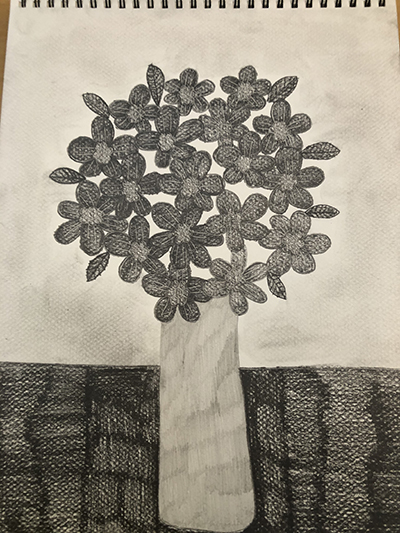‘Beyond Impressed’
May 22, 2020
In mid-March, when university officials made the decision to move courses to a virtual learning format and out of the classroom amid the evolving coronavirus pandemic, one of George Mason’s more unique programs had an important decision to make.
Would the Mason LIFE Program—one of a few post-secondary programs in the country for young adults with intellectual and developmental disabilities in a university environment—follow suit?
“We knew we had to think outside of the box,” Mason LIFE director Linn Jorgenson said. “It is one thing to turn a class. But to turn a program online is really different. I think it was honestly the fact that our biggest vision for Mason LIFE is that we mirror the degree-seeking experience as much as we can. With the support of Division of Special Education and disAbility Research Division Director [and School of Education Director] Pam Baker we knew we could move forward.
“Our team rallied around. We figured it out.”

This was no small task for a program built on face-to-face interaction. But on March 23, when the rest of the university resumed classes, Mason LIFE students in the College of Education and Human Development were right there, dialing in online and joining virtual classrooms with the rest of the Mason student body. On Saturday, the program will cap the semester with a virtual celebration, honoring this year’s 13 graduates.
Back in March, 58 of 59 Mason LIFE students chose to stick with the program and venture online. Students connected via video platforms like Blackboard Collaborate, Google Classroom, and Zoom from all over the country, with 18 students out of state in California, Indiana, Michigan, New Jersey, Texas, and Maryland (the program will welcome its first international student in the fall from Japan).
“Beyond impressed,” Mason LIFE Foundational Academic Specialist Caroline Foster said. “I feel like I knew they could do it. It is one of those things when you work with the special ed population—you don’t ever limit what they can do. But then there are different opportunities that you don’t even think would be an option [for them]. But then they are presented and you’re like, ‘Oh yeah, of course they can do this.’”
Making the jump to the virtual classroom required determination from the program’s versatile staff. The Mason LIFE program consists of just five full-time staff members. Foster, whose brother, Alex, graduated from Mason LIFE last year, works part-time as she is currently a PhD student at Mason.
Thus, the program leans heavily on its support staff, which consists of nearly 100 Mason undergraduate and graduate students. Graduate students in special education teach the foundational courses within the Mason LIFE program. These classes vary from reading, writing, math, independent living and budgeting, and employment skills.
Mason LIFE students also enroll in exploration courses—classes that are offered to the entire student body. These courses range from all over the university and include art, African American studies, biology, geology, western civilization, and Spanish. For some Mason LIFE students, attending these courses may require the assistance of a Mason undergraduate student, who also sits in the class.

Artwork by Mason LIFE student Morgan Barton
In moving online, more than 90 Mason students helped with the three components of Mason LIFE—academic (foundational and exploration courses), employment and housing, and community involvement—that amounted to 93 classes, 32 support sessions, and 74 employment sessions a week.
“It is a big operation,” Jorgenson said. “When we talk about getting the classes online we use all of that support staff in one way or another. I am truly so proud of our Mason LIFE students. I’m also super proud of our staff.”
Perhaps the most challenging aspect of the transition was making sure the students could connect online.
Like their classmates in degree-seeking programs, Mason LIFE students dealt with hiccups here and there, such as faulty internet connection and the audio not working. But the Mason LIFE students persevered through the bumps in the road.
Foster sent out an organized document to students with links for the video chats for all their Mason LIFE classes. Support staff would often join the virtual exploration classes just as they would on campus.
If needed, parents also helped their students sign on. But once the session had started, parents were encouraged to leave the room to ensure the student could have his or her privacy and independence like they would in a regular classroom setting.
“At first, it was hard [to join online] but after days and days of practicing it got much better,” Mason LIFE student Morgan Barton said.
Finishing up her second year in the Mason LIFE program, Barton is back at home with her parents and younger brother in Upper Marlboro, Md. She took a full load of classes, with a mixture of foundational and exploration classes. The latter included an art class — Drawing I — taught by Professor Harold Linton in the School of Art.
“Morgan is not your average drawing student. She is bright, sharp, and very intuitive,” Linton said. “She took more chances in reaching out for creative ideas than anyone. I was fascinated with her comments on others’ work in class critiques and her evident ability to find the good qualities in other students’ work.”
Keeping in touch with her classmates through the video chats has been bittersweet for Barton. While she has enjoyed the chance to see them virtually, she is eager to get back on campus, hang out in the residence halls, and compete in Special Olympics.
“It has been sentimental to me to see most of my friends online for dance parties and bingo,” she said. “I feel like it has been very happy and bittersweet at the same time to see some of my friends who live far away. I can’t wait to see my friends and teachers again and go to my classes.”
